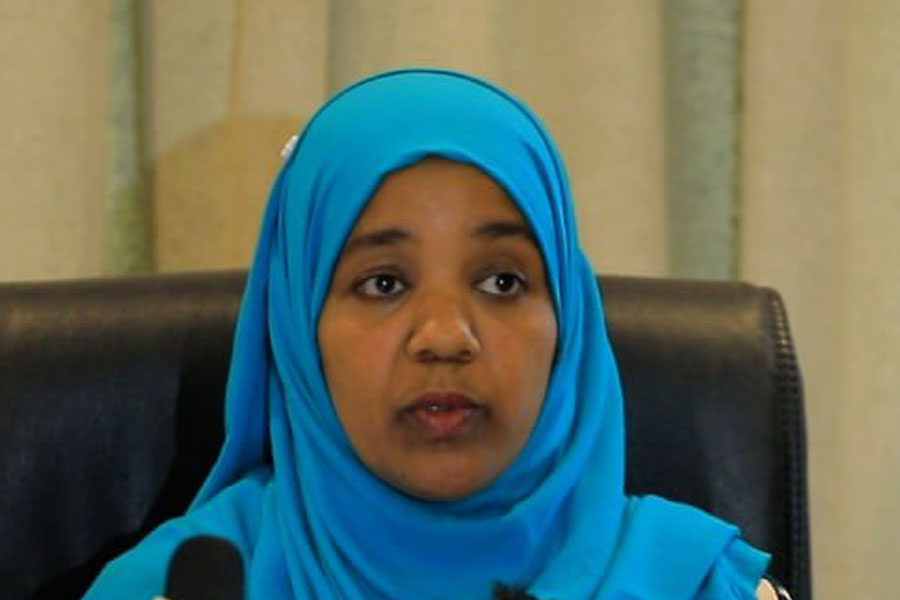
Jun 11 , 2022
By RUTH TAYE (
FORTUNE STAFF WRITER
)
The civil service is undergoing a restructuring under the watchful eye of Bezabih Gebreyes, head of the Civil Service Commission, nearly a year after the formation of a new administration.
Last October, Parliament approved restructuring the executive branch, with the number of ministerial portfolios climbing by three to 22.
Bezabih, appointed to lead the Commission in 2018, oversees the restructuring process. A long track record in supervising public sector reforms makes him ideal for the job. He has worked at the Commission for over two decades, directing a reform programme introduced in the mid-1990s.
Reforming the public service sector is a complex and challenging task involving fundamental changes in the rules of engagement that require a long-term commitment and adequate knowledge, says Shumay Berhie (PhD), a public administration lecturer at Addis Abeba University. Although poorly-functioning public institutions need restructuring, repeated attempts at reform could potentially have an adverse impact, he cautions.
"It could weaken service delivery and undermine civil servants' motivation," said Shumay.
Over the past three decades, no less than six major civil service reform programmes have been implemented. All were undertaken with a top-down approach, which the expert says was a factor for the perceived lack of commitment, particularly at the bottom of the hierarchy.
The ongoing restructuring Bezabih oversees is the second major civil service restructuring in two decades. Bezabih was also involved in the administration's downsizing in 2018, a few months after Prime Minister Abiy Ahmed (PhD) took office, to 19 ministries.
The latest restructuring comes following a directive by the Commission last November to manage the redeployment of civil servants. It directs public offices to establish six-member committees that submit proposals for an organisational structure to the Commission before commencing with the redeployment of staff. Over half a dozen ministerial offices have done so thus far.
A few of them were returned for alteration because they did not meet the standards, according to Nigist Geremew, director of communications.
Last month, the Commission approved a submission by the Ministry of Agriculture (MoA) under Umer Hussein. The Ministry employs over 1,400 civil servants.
Candidates for the positions of director, deputy-director and team leader will sit for exams next week, a Ministry official disclosed to Fortune. The results will account for 15pc of the evaluation points, while academic credentials and work experience make up half. Officials hope the restructuring will allow the Ministry to focus on policies and strategies, delegating regulatory tasks, including permitting and issuing certificates of competency to businesses, to 10 agencies, four of which are newly formed.
The Ethiopian Agricultural Authority will be responsible for issuing permits to agricultural inputs importers and distributors. The Institute of Animal Health was formed after an agency in charge of eradicating the Tsetse fly and trypanosomosis (sleeping sickness), and the National Animal Health Diagnosis & Investigation Centre were merged. Both agencies had close to 500 employees.
According to Tesfaye Raphael, its director general, the Institute has yet to redeploy civil servants.
The Ministry of Urban Development & Infrastructure took over the regulatory responsibilities of the construction of roads paid by the federal government from the former Ethiopian Roads Authority (now Administration). Undergoing a major restructuring, 197 of its 700 employees took exams two weeks ago prepared by the Civil Service University, competing for senior positions at the Ministry.
"Employees will be assigned based on the results," said Hailu Belaynehi, director of human resources.
An official at the Agriculture Ministry told Fortune that many civil servants are shying away from the evaluation process because a lot of weight is given to supervisor assessments.
“The top-down approach has been put in place without ensuring the unity of purpose among civil servants," said the expert.
Shumay observed that the effectiveness of any restructuring is based on improvements in service delivery to the public.
"The previous reforms haven't brought the desired results partly because of a lack of commitment," he told Fortune.
PUBLISHED ON
Jun 11,2022 [ VOL
23 , NO
1154]

Fortune News | Jan 26,2019

Fortune News | Aug 08,2020

Editorial | Jul 17,2022

Editorial | Jul 05,2025

Fortune News | Aug 17,2025

Advertorials | May 24,2024

Radar | Mar 04,2023

Viewpoints | Jul 13,2020

Radar | Sep 23,2023

My Opinion | Oct 01,2022

Dec 22 , 2024 . By TIZITA SHEWAFERAW
Charged with transforming colossal state-owned enterprises into modern and competitiv...

Aug 18 , 2024 . By AKSAH ITALO
Although predictable Yonas Zerihun's job in the ride-hailing service is not immune to...

Jul 28 , 2024 . By TIZITA SHEWAFERAW
Unhabitual, perhaps too many, Samuel Gebreyohannes, 38, used to occasionally enjoy a couple of beers at breakfast. However, he recently swit...

Jul 13 , 2024 . By AKSAH ITALO
Investors who rely on tractors, trucks, and field vehicles for commuting, transporting commodities, and f...

Oct 18 , 2025
The political establishment, notably the ruling party and its top brass, has become p...

Oct 11 , 2025
Ladislas Farago, a roving Associated Press (AP) correspondent, arrived in Ethiopia in...

Oct 4 , 2025
Eyob Tekalegn (PhD) had been in the Governor's chair for only weeks when, on Septembe...

Sep 27 , 2025
Four years into an experiment with “shock therapy” in education, the national moo...